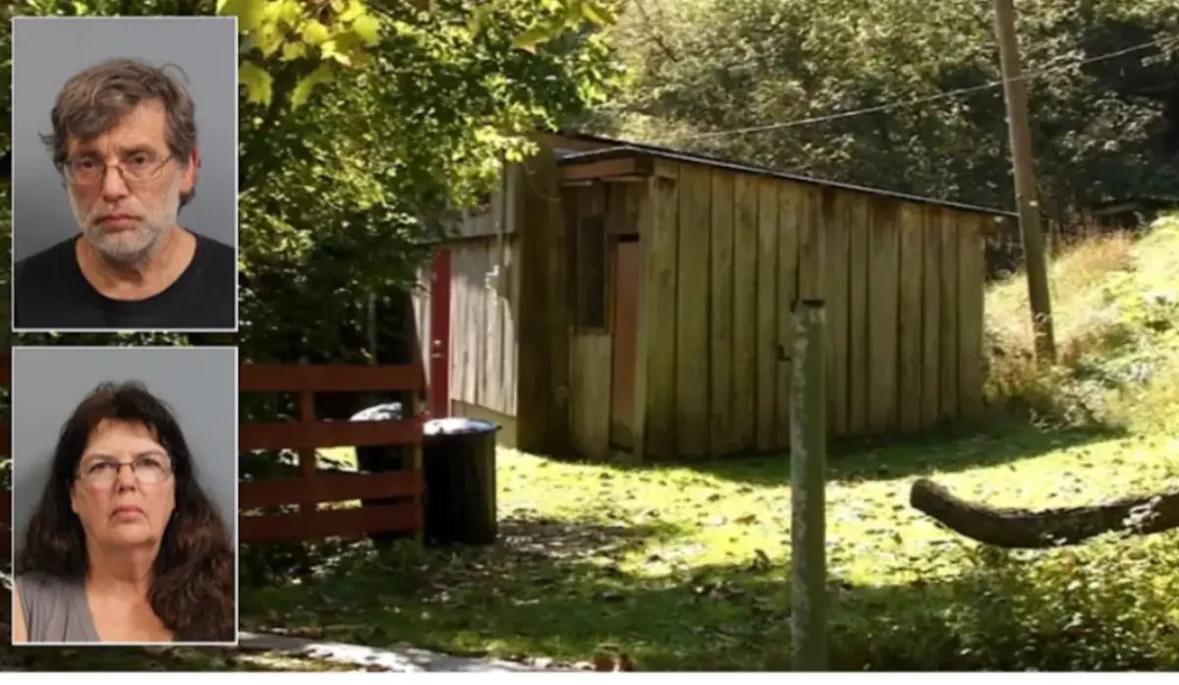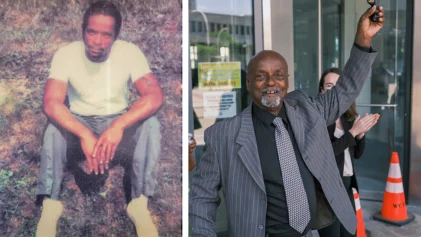Friends and relatives of a white West Virginia couple accused of locking their adopted Black children in a barn and allegedly forcing them to work as slaves are rallying to their defense, claiming the husband and wife are “the least racist people around.”
Donald Ray Lantz, 63, and Jeanne Kay Whitefeather, 62, of Sissonville, remain in South Central Regional Jail on charges of child abuse after a wellness check at their Cheyanne Lane farmhouse last year led to the discovery of two of the couple’s five adopted children living in deplorable conditions.
Both parents have pleaded not guilty to multiple charges of human trafficking of a minor child, use of a minor child in forced labor, and child neglect, creating a substantial risk of serious bodily injury or death.

Back in October, investigators found two of the couple’s Black children — a 14-year-old boy and a 16-year-old girl — inside a ramshackle storage shed on the back of the property, which had no working lights or running water and fitted with a door that locked from the outside.
Despite the felony indictment against the couple, Whitefeather’s brother, 60-year-old Marcus Hughes, maintained that the racially charged allegations against them didn’t add up.
“They’ve been made out to be monsters, which isn’t true,” he told the Daily Mail. “You’re supposed to be innocent until you’re found guilty.”
Hughes suggested that the couple’s charitable work on behalf of Black children had incensed the community.
“Just because nobody’s told her side of the story doesn’t make her guilty, he added. “There were issues in the neighborhood because white people are raising Black kids.”
Police also found a third child, identified as a 9-year-old Black girl, who was confined to a loft inside the main house, away from the presence of the adults and isolated from her other siblings, according to reports.
The couple’s two remaining adopted children are 11 and 6 years old.
All five of the couple’s adopted children are now in the care of the state.
Hughes says they haven’t been told where the kids are or how they’re doing.
He also mentioned that authorities won’t let the family provide clothes and toys for the children.
He said the family is no longer supporting adoption due to the accusations, noting they moved from Washington in search of a normal life.
“We don’t even know how to spell ‘racists,’” Hughes exclaimed. “It’s just not part of the culture there. We’re the least racist people around, it’s not who we are, and to be accused of that is just icky for our family.”
Hughes said he has always supported law enforcement, but now said he was rethinking that stance, feeling that the couple was being railroaded by law enforcement.
“I’m a blue stripe guy,” Hughes went on. “I’ve always backed the cops. But then we got to this, and we went out in the house and looked at ourselves, and we said this doesn’t seem right. They just lied. It’s not even a mistake. They’re being held in jail based on information that’s not true.”
Before moving to West Virginia, the couple lived in Washington state, where neighbors called police on the couple after allegedly witnessing them mistreating their kids, according to reports.
This seemingly prompted Lantz and Whitefeather to move 2,200 miles east to evade police and child welfare authorities.
Several police reports from the family’s time in Washington revealed additional disturbing details, including instances where two of their children ran away from home after the couple allegedly forced one child at gunpoint to remain in his room and used a bullwhip for discipline, according to reports.
Daily Mail said its sources revealed that the couple packed their bags for West Virginia when they learned the sheriff’s office in Okanogan County, Washington, was preparing to remove the couple’s oldest son from the home for his safety.
By October 2023, the family had moved to the ranch in Sissonville, West Virginia, where police rescued the children and arrested the parents after receiving a call there from a concerned neighbor.
At their initial hearing in October, Lantz and Whitefeather pleaded not guilty, and Kanawha County Circuit Judge Maryclaire Akers set bond at $200,000 each.
In early February, the couple sold their 80-acre property in Tonasket, Washington, near the Canadian border, for $725,000 and signed over power of attorney to Hughes, who arranged bail. The couple was released that month to await trial.
They remained free for several months, but in May, a grand jury indicted them on more than a dozen new charges, including human trafficking, which prompted Akers to revoke the lower bond and order the couple jailed again in lieu of $500,000 apiece.
“Along with human trafficking and neglect with serious risk of bodily injuries or death, I don’t find the bond to be sufficient,” Akers told defense attorneys at the second bond hearing.
The upgraded charges include alleged use of a minor child in forced labor, child neglect creating a substantial risk of serious bodily injury or death, as well as false swearing and potential civil rights violations based on color, race, or ancestry, according to court documents.
The indictment suggests that three of the five children were Black and were adopted from a shelter for homeless and vulnerable. The human rights charges stemmed from those children being specifically targeted and forced to work because of their race.
A small toilet seat torn from an RV was placed in the barn for the children to share whenever they had to go to the bathroom, police said.
A close friend of Whitefeather, Darren Wise, also came to her defense, claiming the allegations were completely untrue.
“The family was treated horribly,” he told the Daily Mail. “Did Jeanne and Don make a mistake leaving? Probably. I wouldn’t deny that. But the allegations, I don’t see how they can be accurate.”
Wise suggested that Lantz and Whitefeather were not well-liked in the neighborhood.
“Jeanne had expressed to me that some of the neighbors in West Virginia weren’t as welcoming as they had anticipated or expected them to be, which is why they were in the process of moving,” he said.
Previously, during the second bond hearing, Whitefeather explained that the barn where the children were found was a “teenage clubhouse” and maintained that the children were not actually locked inside.
But neighbors disputed this claim, saying “the children were forced to perform farm labor and were not permitted inside the residence,” the indictment states.
When rescued, the 16-year-old girl informed deputies that they had been locked in the barn for approximately 12 hours and had last eaten around sunrise. According to Burdette, the children locked inside could not exit the shed, so deputies had to force their way into the shed.
Deputy H.K. Burdette entered the shed, and they immediately noticed a disturbing smell and a wave of heat due to the lack of circulating air.
Both children appeared feral and dirty, reeking of body odor, while the boy had “open sores on his bare feet,” according to court papers.
The children told investigators they were forced to sleep on a bare concrete floor with no mattress or covers.
Police remained at the house for three hours before Lantz arrived home with an 11-year-old boy.
When authorities checked the home for other potential victims, they found the 9-year-old holed up in the loft, and Lantz was placed under arrest.
About an hour later, Whitefeather returned home and guided deputies to another 6-year-old girl who was visiting with another couple from their church.
During the latest bond hearing, Kanawha County prosecutors argued that the couple’s original cash bonds were likely obtained through trafficking profits, pointing to the fact that the couple produced the $400,000 bond despite a lack of obvious means to do so.
At the same proceeding, Lantz and Whitefeather claimed they possessed no income or assets, raising questions about the source of the funds for their bond.
Kanawha County Assistant Prosecuting Attorney Christopher Krivonyak characterized the money posted for the couple’s release as “contraband directly or indirectly used or intended for use” to violate human trafficking laws.
Krivonyak said they have since sold the Sissonville home, where they were arrested for $295,000.
All those funds have been seized by the court as potential profits from human trafficking, rendering them inaccessible to the defendants.
Prosecutors argued that even if the bond money came from legitimate sources, its use was intended to further human trafficking and forced labor operations.
Akers also remarked that the case was unlike any other she had heard during her entire career as a judge.
“It alleges human trafficking, human rights violations, the use of forced labor,” Akers said, according to reports. “Human rights violations specific to the fact that these children were targeted because of their race and they were used basically as slaves from what the indictment alleges.”
Both Lantz and Whitefeather pleaded not guilty to the new charges in the indictment. However, they remain in jail as they have been unable to meet the higher bond amount.
Their next court appearance is scheduled for Sept. 9.


